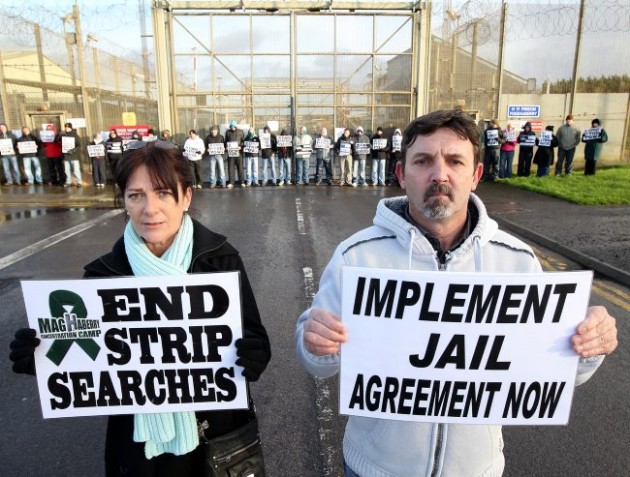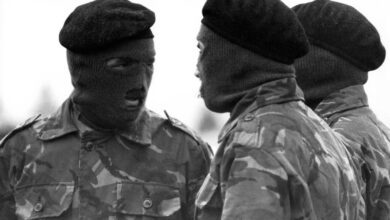Nessuna fine in vista per la protesta dei POW a Maghaberry
There’s no end in sight for Maghaberry prison dispute
By Eamonn McCann
 Lord Morrow was mightily miffed on Monday that Maghaberry prisoners have cost us a million pounds.
Lord Morrow was mightily miffed on Monday that Maghaberry prisoners have cost us a million pounds.
Justice Minister David Ford told the Fermanagh-South Tyrone MLA that: “The total cost of the damage caused by republican separated prisoners during their protest, since it began on Easter Sunday 2010, is £1,007,000.” A whole lot of lettuce, right enough.
Of course, if the protest had lasted only a few months, if it had been over and done with by August, the cost would have been far less, and final. This is not a thought likely to mollify the DUP man.
“It’s time for a clampdown on costs and those who are controlling this situation from the inside,” said Lord Morrow. “If they do not abide by prison rules, such as washing, they should be placed under the same sanctions [as] any other prisoner.”
The protest, he suggested, was aimed at recreating the “prisoner-of-war” conditions which obtained in Long Kesh following the hunger strikes of 1980 and 1981.
But what’s striking about the Maghaberry protest is the relative modesty of its aims and, consequently, the relative ease with which it might be settled.
Indeed, there was a widespread presumption in August last year that the dispute had been resolved on the basis of an arrangement still available to all sides.
The issue at the heart of the matter is ‘full-body searching’ of prisoners entering or leaving the separated unit at Roe House within Maghaberry. It was the routine practice of full-body searching which triggered the launch of a ‘dirty protest’ at Easter last year.
The agreement struck in August, following a ‘facilitation process’ involving the Prison Service and the prisoners and endorsed by the Justice Department, involved a number of changes to the day-to-day regime and, critically, the replacement of routine full-body searching by an arrangement centred on the installation of a ‘Boss chair’, designed to detect hidden or banned items on the prisoner’s person.
The prisoners accepted that the Prison Service would retain a right to order full-body searches when the Boss chair, or ‘intelligence or suspicion’, suggested that prohibited items might be concealed on a prisoner’s body.
The position of the Justice Department, spelt out to the Telegraph four months ago, is that, “The Prison Service remains fully committed to the full implementation of the August Agreement.”
It added, however, that, “We recognise tensions remain in relation to the interpretation of the Agreement.” The prisoners and their supporters say that this is code for a refusal by prison staff to put the agreement into practice. They claim, too, that the Justice Department has been unwilling to insist on implementation.
Prisoners’ lawyers have suggested that these attitudes can also be seen in a failure by the department to introduce changes in the overall prison regime set out last February in the report of the review team under Dame Ann Owers.
This report called for “a programme of change and transformation of culture, approach and working practices”.
Eight months later, the team reported to the department that, “Little has changed in practice, despite . . . a new sense of purpose at the top of the service and support from the Justice Minister. The endemic and systematic problems . . . remain unresolved and public money is being wasted.”
The wording can be interpreted as ascribing a share at least of responsibility for the persistence of the “endemic and systematic problems” on rank-and-file elements, as opposed to “the top” of the Prison Service.
Whether the amount of public money identified as having been wasted as a result equals or surpasses the £1m loss exercising Lord Morrow may be a matter of speculation. But it seems likely.
The prisoners enjoy little public sympathy. The actions which they have been convicted or accused of are deeply unpopular.
They may be able, plausibly, to see themselves as the successors, or continuation, of the Provisional and other manifestations of the IRA. But even accepting this designation, they are soldiers who have been deemed surplus to requirements now the war is over.
And former IRA leaders now embedded in constitutional politics, notwithstanding carefully calibrated expressions of concern, have a greater vested interest than most in denying them the legitimacy which they fear might be implied by special prison arrangements. The Maghaberry prisoners have no obvious area of potential support to turn to.
Against this background, irrespective of how obvious a solution might seem when set down on paper, it is difficult to envisage the dispute ending any time soon.
And we all know what the likely next step in escalation will be.





